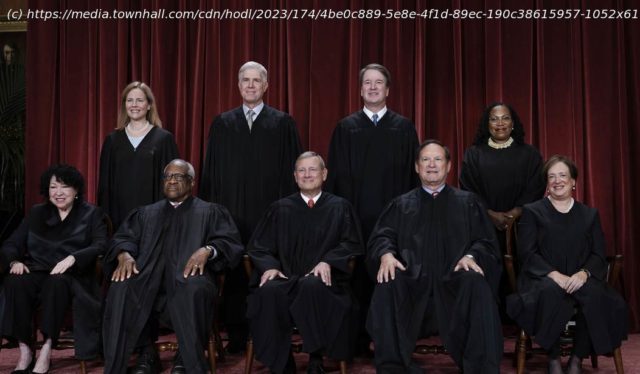Array
The last decision of the Supreme Court term may be its most impactful . but perhaps not as impactful as some may think. On a 6-3 decision written by Chief Justice John Roberts, the court ruled that the constitutional separation of powers provides presidents with “absolute immunity” from prosecution for official acts in office — in terms of ‘core’ constitutional duties.
As for other official acts, the court rules that presidents should have the preumption of immunity, but that courts could consider that application on a case-by-case basis. However, Roberts warned with significant portent, presidents have no presumption of immunity from unofficial acts in office:
The parties before us do not dispute that a former President can be subject to criminal prosecution for unofficial acts committed while in office. See Tr. of Oral Arg. 28. They also agree that some of the conduct described in the indictment includes actions taken by Trump in his unofficial capacity. See id., at 28–30, 36–37, 124.
They disagree, however, about whether a former President can be prosecuted for his official actions. Trump contends that just as a President is absolutely immune from civil damages liability for acts within the outer perimeter of his official responsibilities, Fitzgerald, 457 U. S., at 756, he must be absolutely immune from criminal prosecution for such acts. Brief for Petitioner 10. And Trump argues that the bulk of the indictment’s allegations involve conduct in his official capacity as President. See Tr. of Oral Arg. 30–32. Although the Government agrees that some official actions are included in the indictment’s allegations, see id., at 125, it maintains that a former President does not enjoy immunity from criminal prosecution for any actions, regardless of how they are characterized. See Brief for United States 9.
We conclude that under our constitutional structure of separated powers, the nature of Presidential power requires that a former President have some immunity from criminal prosecution for official acts during his tenure in office. At least with respect to the President’s exercise of his core constitutional powers, this immunity must be absolute. As for his remaining official actions, he is also entitled to immunity. At the current stage of proceedings in this case, however, we need not and do not decide whether that immunity must be absolute, or instead whether a presumptive immunity is sufficient.
It’s reasonable to note that the issues in the prosecutions of Donald Trump do not involve ‘core’ constitutional duties. To the extent that they involve official acts — such as in the January 6 riot — the courts will still have to suss out whether those are covered by presumptive immunity, as well as which acts are official and which are private.
Roberts notes that the courts involved in these prosecutions have yet to address those questions, necessarily because of the unknown validity of the immunity claims:
Despite the unprecedented nature of this case, and the very significant constitutional questions that it raises, the lower courts rendered their decisions on a highly expedited basis. Because those courts categorically rejected any form of Presidential immunity, they did not analyze the conduct alleged in the indictment to decide which of it should be categorized as official and which unofficial. Neither party has briefed that issue before us (though they discussed it at oral argument in response to questions). And like the underlying immunity question, that categorization raises multiple unprecedented and momentous questions about the powers of the President and the limits of his authority under the Constitution. As we have noted, there is little pertinent precedent on those subjects to guide our review of this case—a case that we too are deciding on an expedited basis, less than five months after we granted the Government’s request to construe Trump’s emergency application for a stay as a petition for certiorari, grant that petition, and answer the consequential immunity question. See 601 U. S., at ___. Given all these circumstances, it is particularly incumbent upon us to be mindful of our frequent admonition that “[o]urs is a court of final review and not first view.” Zivotofsky v. Clinton, 566 U. S. 189, 201 (2012) (internal quotation marks omitted).
Roberts attempts to set up some guidelines for lower courts, again a necessity springing from the novelty of this ruling.
Home
United States
USA — mix BREAKING: SCOTUS Rules Presidents Have 'Absolute Immunity' — For 'Core' Official Acts






